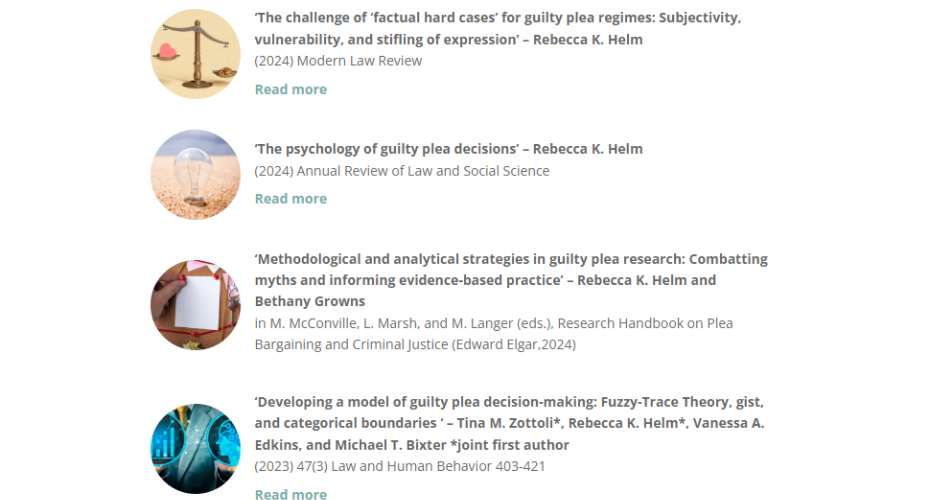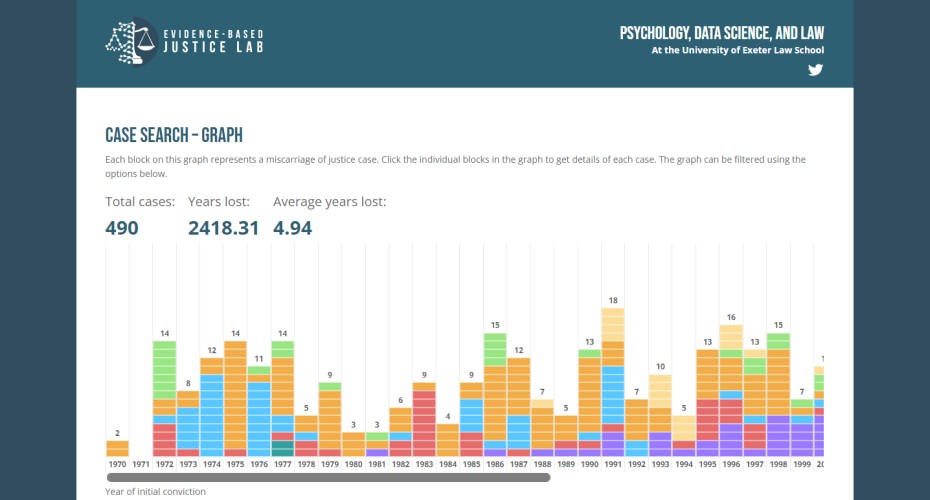Evidence-Driven Research to Inform Law and Policy
We’re examining evidence to inform empirically robust law and legal research.
By combining rigorous data-driven and traditional legal research, we’re using data to inform legal research and to promote the effective translation of scientific research and evidence into law and policy.
The intersection of law and science: pioneering empirical legal research.
Professor Rebecca Helm and researchers in the Evidence-Based Justice Lab are working at the intersection of cognitive psychology, experimental jurisprudence and law. Their focus is on combining rigorous data-driven research grounded in behavioural science with more traditional legal research in order to promote the effective translation of data and scientific research into legal policy.
The team's establishment of the UK’s first searchable Miscarriages of Justice registry is a significant contribution to the field of legal studies, providing a wealth of data that can be analysed to understand the complex factors that contribute to wrongful convictions.
Hidden pressures: Why innocent people plead guilty.
The team’s work on guilty pleas was influential in the quashing of convictions involved in the Post Office Horizon Scandal. A significant number of victims of the scandal had pleaded guilty to at least one charge against them, highlighting significant pressures to plead guilty and the prevalence of guilty pleas, even in cases involving innocent defendants.
More generally, the team’s work, alongside national and international partners, provides new insights into the pressures to plead guilty that many defendants face, and how those pressures lead to both wrongful convictions and discriminatory outcomes.
They have identified various systemic issues and individual pressures that can undermine free choice in those making plea decisions and have extensively analysed the inconsistency of current procedure surrounding guilty pleas with psychologically meaningful conceptions of autonomy and voluntariness.
By examining these pressures and relevant underlying psychological mechanisms, the team have demonstrated a range of unintended consequences associated with the current guilty plea system that create inconsistencies between convictions in that system and normative legal principles. This work highlights the importance of new evidence-based procedure to prevent future miscarriages of justice and protect defendants in the criminal justice system.
“My work on incentivised admissions has provided new insight into how incentives to plead guilty operate in practice. For example, the work has examined how sentence discounts create pressure for innocent people to plead guilty, and how this pressure interacts with concepts of autonomy in the legal system. It has also explored how incentives to plead guilty contribute to systemic inequalities in the justice system, including based on gender, age and ethnicity."
Professor Rebecca Helm
Creating a better evidence base to inform legal practice and policy.
The Evidence-Based Justice Lab’s establishment of the UK’s only searchable Miscarriages of Justice registry is a significant contribution to the field of legal studies. This registry serves as a valuable resource for understanding the causes of wrongful convictions, allowing researchers to identify patterns and trends that can inform practice and policy.
Researchers in the lab are also collecting and analysing data in a range of other fields. One important area of work focuses on the evaluation of testimony in the legal system.
This work, built on theory-driven models of decision-making (including Professor Helm’s model of jury function), examines presumptions that the legal system makes about testimony itself and about the reliability of legal decision-makers as evaluators of memory and truthfulness. Through utilising underlying theory and collecting data involving a range of legal decision-makers, the team have been able to identify areas in which current practice and policy are resulting in evaluations that are inconsistent with scientific evidence and likely result in unjust outcomes. The team are now working with a range of experts in memory and decision-making as well as stakeholders in order to improve the integration of existing knowledge into legal practice and to improve outcomes
Through the Lab website, the team have made available data relating to a range of current research projects in accessible formats in order to promote the integration of data into legal research and policy.
At a time when justice systems across the world are likely to be malfunctioning in important ways, the team’s creation of a strong and publicly accessible evidence base can inform legal practice and policy that function as intended, and can help to inform legal arguments and decision-making that are grounded in empirical reality rather than ‘common-sense.’
By harnessing the power of data, the team’s work is empowering researchers, policymakers, and legal professionals to drive meaningful reforms to create fairer and more effective legal policy.
“In our work, we draw on a range of new and exciting techniques and methodologies, from computational modelling to functional magnetic resonance imaging. Many of our datasets are available online and are accessed by members of the public, by researchers and by practitioners from across the world.”
Professor Rebecca Helm
Hear more from our Law academics

Richard Moorhead FAcSS
Professor of Law and Professional Ethics

Professor Rebecca Helm
Professor of Law and Empirical Legal Studies
Richard Moorhead FAcSS
Professor of Law and Professional Ethics
Richard Moorhead is Professor of Law and Professional Ethics and sits on the Horizon Compensation Advisory Board advising the Department for Business and Trade on Post Office compensation schemes. With 30 years of experience researching lawyers and legal services drawing on law, psychology, sociology, management science, and economics, working with governments, NGOs, and regulators, he now focuses on lawyers’ ethics.
Founder of the lawyerwatch.blog, he has recently completed a project on ethics and the rule of law for the Legal Services Board with Steven Vaughan. He is currently working on the Post Office Scandal with Karen Nokes, Sally Day, and Rebecca Helm on a three-year ESRC funded project examining the impacts and causal pathways of ethical error.
Profile page
Richard Moorhead FAcSS
Professor of Law and Professional Ethics
Richard Moorhead is Professor of Law and Professional Ethics and sits on the Horizon Compensation Advisory Board advising the Department for Business and Trade on Post Office compensation schemes. With 30 years of experience researching lawyers and legal services drawing on law, psychology, sociology, management science, and economics, working with governments, NGOs, and regulators, he now focuses on lawyers’ ethics.
Founder of the lawyerwatch.blog, he has recently completed a project on ethics and the rule of law for the Legal Services Board with Steven Vaughan. He is currently working on the Post Office Scandal with Karen Nokes, Sally Day, and Rebecca Helm on a three-year ESRC funded project examining the impacts and causal pathways of ethical error.
Profile page
Professor Rebecca Helm
Professor of Law and Empirical Legal Studies
Rebecca Helm is Professor of Law and Empirical Legal Studies, and a UK Research and Innovation Fellow. She is recognised as one of the leading experts in the UK and internationally in applying behavioural science to the legal system, most notably in the area of guilty plea decision-making. She founded and directs the Evidence-Based Justice Lab, whose miscarriages of justice registry has been utilised by hundreds of thousands of visitors from around the world since its formation in 2021. Her research has been published in leading outlets in both law and psychology, and has been widely cited internationally by academics and courts, and she has recently published a monograph, How Juries Work, with Oxford University Press.
She is currently working on a UKRI-funded project examining testimony evaluation, as well as collaborative projects focused on examining the Post Office Scandal (with Richard Moorhead, Karen Nokes, and Sally Day), developing more effective models of evidence synthesis and evaluation (with Jon Williamson and Trish Greenhalgh), and utilising compulational modelling techniques to examine guilty plea decision-making (with Tina Zottoli, Vanessa Edkins, and Mike Bixter).
Profile page

Connect with us
We work with many colleagues at other institutions across the world on joint research and education projects. Connect with our academic community and explore exciting new possibilities.
Connect with us

Let’s work together
We power transformative change for businesses by translating our research and education power into real world impact. Get in touch and work with us to deliver a greener, healthier and fairer future.
Get in touch

Explore our Law research
Discover how our research groups are tackling critical issues at the intersection of law, society, and the digital age.
Read more










